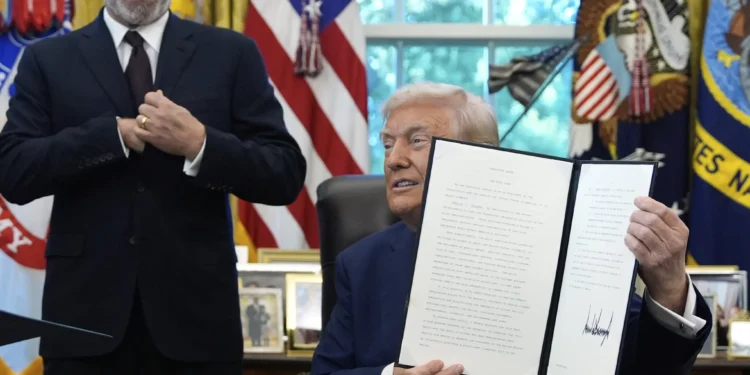President Donald Trump signed a proclamation Friday establishing an unprecedented $100,000 annual fee for H-1B worker visas, a move that could significantly impact Washington state’s technology sector and its reliance on foreign talent.
The substantial fee increase represents a dramatic shift from current costs, which include a $215 general filing fee and $780 employer petition fee. Trump characterized the change as necessary to address what he called deliberate exploitation of the program.
“It is therefore necessary to impose higher costs on companies seeking to use the H-1B program in order to address the abuse of that program while still permitting companies to hire the best of the best temporary foreign workers,” Trump stated in his proclamation.
The policy targets tech companies that Trump accused of “significantly harming American workers in computer-related fields” through systematic manipulation of the visa system.
Washington state received approximately 9,000 approved H-1B applications for fiscal year 2025, with Microsoft accounting for about 5,200 of those approvals. Nationwide, Amazon employees represented the highest number of applications with over 10,000.
Immigration attorney Ester Greenfield of MacDonald, Hoague & Bayless described the fee as having a “devastating impact” on employers utilizing the H-1B program. “It doesn’t make sense to me as an economic thing,” Greenfield said. “Historically, bringing in smart, capable, well-educated folks to work in skilled jobs is good for the economy.”
The proclamation appeared to reference specific companies without naming them directly. One passage described a software company approved for over 5,000 H-1B workers while announcing layoffs totaling more than 15,000 employees, apparently referencing Microsoft’s recent workforce reductions.
Microsoft declined to comment Friday, while Amazon did not respond to requests for comment regarding the new policy.
University of Washington economist Jacob Vigdor suggested the policy could push companies toward offshore hiring rather than paying the substantial fee. “These corporations have the option of hiring foreign workers without bringing them to the United States,” Vigdor explained.
The H-1B program, established in 1990, allows companies to sponsor foreign workers in specialty occupations including scientists, engineers, and medical technicians. Congress caps annual visas at 65,000 for bachelor’s degree holders and 20,000 for advanced degree recipients.
Competition for visas remains intense, with approximately 442,000 applicants last year competing in the annual lottery system administered by U.S. Citizenship and Immigration Services.
Smaller companies may face disproportionate impacts from the fee structure compared to tech giants with substantial resources, Vigdor noted.
Trump simultaneously signed a separate order creating a federal “Gold Card” program expediting visa processing for individuals paying $1 million or companies paying $2 million on their behalf.
The proclamation marks an expansion of Trump’s immigration enforcement beyond traditional targets of undocumented migrants and asylum seekers to include skilled foreign workers legally employed in STEM fields.
Implementation details remain unclear, including potential exemptions for universities and nonprofits. The policy may face legal challenges similar to previous immigration orders that courts have blocked or modified.







